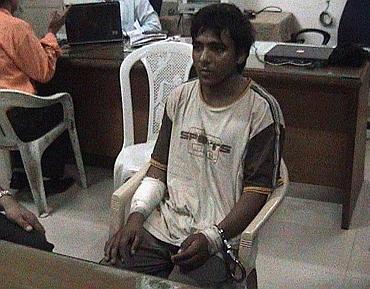 | « Back to article | Print this article |
 Ajmal Kasab, the face of the dastardly 26/11 terror strike on Mumbai who was hanged on November 21, had begged for 'daya' (mercy) from the President through his four-line clemency plea written in elementary Urdu, which was rejected.
Ajmal Kasab, the face of the dastardly 26/11 terror strike on Mumbai who was hanged on November 21, had begged for 'daya' (mercy) from the President through his four-line clemency plea written in elementary Urdu, which was rejected.
The handwritten petition dated September 12, 2012, which has been made public more than a month after Kasab was hanged, shows glaring Urdu language errors.
The application has been provided to Lucknow-based activist Urvashi Sharma under the right to Information Act. In his brief application, Kasab pleaded, "Sir, mujhe fansi
ki saza Supreme Court ho gayi hai. Fansi ki saza se mujhe chorr diya jaye. Mere upar daya karo aur muje fansi ki se riha kar de. Apka Ajmal Kasab (sic)."
It was translated by the jail authorities as, "Sir, I have been sentenced by Supreme Court for capital punishment (Hanged till death). It is most humbly and respectfully pleaded to spare me from death sentence and also get me released from the gallows. It is my humble request. Yours, Ajmal Kasab."
Pakistani citizen Kasab, the sole surviving terrorist from the 26/11 terror attack, was hanged to death at the Yerawada Jail in Pune on November 21, 2012. He was among the ten terrorists who had entered Mumbai through sea route on November 26, 2008 and launched a three-day mayhem which killed 166 people.
Twenty-five-year-old Kasab had been lodged in the Arthur Jail Road here ever since he was arrested immediately after the attack in 2008. He was convicted and given capital punishment by the trial court on May 6, 2010 which was upheld by the Bombay high court on February 21, 2011. The Supreme Court subsequently upheld the sentence on August 29 last year.
His mercy petition was rejected by President Pranab Mukherjee on November 5, 2012.